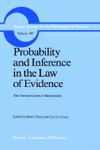 Tim van Gelder tagged me in a kind of blog-network pyramid scheme: relate five things about yourself that others may not know, then tag five others. Although this feels a bit like the sort of thing that junior high school (middle school) students do, I cannot resist the siren call of a person as eminent as Tim van Gelder. So here goes:
Tim van Gelder tagged me in a kind of blog-network pyramid scheme: relate five things about yourself that others may not know, then tag five others. Although this feels a bit like the sort of thing that junior high school (middle school) students do, I cannot resist the siren call of a person as eminent as Tim van Gelder. So here goes:1. In 1905 the Czar of Russia exiled my maternal grandfather from Latvia to St. Petersburg (Russia!). This exile apparently was not a fate worse than death. My grandfather met my grandmother (a Polish woman), who gave birth to my mother there, in St. Petersburg, in 1910.Now tagged:2. In my sophomore or junior year in college I proclaimed that fuzziness was my first principle -- but I said that I should not say this (about fuzzines) too clearly. (Documentary proof of this fuzzy proclamation is on file with the author.) A couple of years later Lotfi Zadeh published his seminal paper on fuzzy sets. See Pragya Agarwal, Lotfi Zadeh: Fuzzy logic-Incoporating Real-World Vagueness. Zadeh's proclamations, I admit, were more profound (and more influential) than mine. Still, ...
3. In my childhood homes my family (mother, daughter, son [i.e., Peter T.]) did not have a telephone or a television. We first got a radio when I was in the 10th or 11th grade in high school. I did not have the regular use of a telephone until I went to college. I did not own a television set until after I graduated from law school. I spent a lot of time in the Columbus, Ohio, public library, whose construction was financed by Andrew Carnegie.
4. My second car was a 1936 Packard. I acquired it in the summer after my graduation from high school. I was forced to sell the car. I sold it for about $100 to Jim Elliot, who became a world-famous astronomer. (He discovered the rings of Uranus.) Moral: astronmers are smarter -- or luckier -- than lawyers.
5. My mother tried to teach Jim Elliot spoken Russian. Moral: astronomers should stick to astronomy.
1. David Kaye
2. Priit Parmakson (who maintains a quasi-blog)
3. Edwward Cheng
4. David Faigman
5. Joseph Sanders
